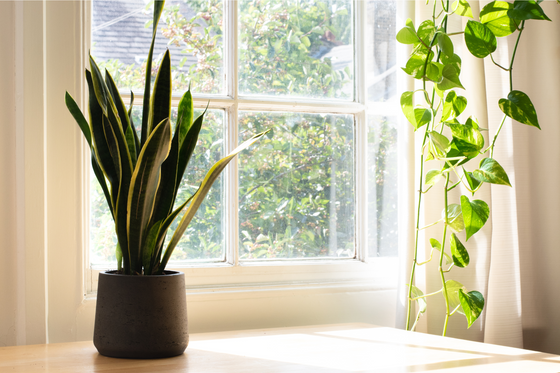Why Natural Light is so Important for a Healthy Home
January 09, 2023

Natural light is essential for a healthy home. It has numerous benefits, including boosting productivity, improving mental health, having a positive impact on children, having environmental benefits, improving sleep quality, and providing aesthetic benefits. In this blog, we'll delve into each of these benefits in greater detail.
First and foremost, natural light can boost productivity at home. Studies have shown that people who work in environments with plenty of natural light are more productive than those who don't. This is because natural light helps to regulate our body's natural sleep-wake cycle, known as the circadian rhythm. When we're exposed to natural light during the day, it helps to keep us alert and awake, which can improve our ability to focus and get things done.
Natural light also has numerous benefits for mental health. It can help to reduce stress, anxiety, and depression by increasing the production of serotonin, a neurotransmitter that helps to regulate mood. This is because natural light helps to regulate the body's production of melatonin, a hormone that helps to regulate sleep. When we're exposed to natural light during the day, it can help to improve our mood and overall sense of well-being.
The positive impact of natural light on children cannot be overstated. Children who are exposed to natural light during the day tend to have better sleep patterns, improved behavior, and higher levels of concentration. This is because natural light helps to regulate the body's production of melatonin, which is important for healthy sleep. Children who get enough natural light during the day are also more likely to have healthier bones, as natural light helps the body to absorb vitamin D, which is essential for strong bones.
In addition to the benefits for individuals, natural light also has numerous environmental benefits. It can reduce energy consumption, as it reduces the need for artificial lighting, which requires electricity. This can help to lower greenhouse gas emissions and reduce our carbon footprint. Natural light is also a renewable resource, unlike electricity, which is generated from non-renewable sources such as fossil fuels.
Natural light can also improve sleep quality. As mentioned earlier, natural light helps to regulate the body's production of melatonin, which is essential for healthy sleep. When we're exposed to natural light during the day, it can help to reset our body's internal clock, which can improve the quality of our sleep. People who get enough natural light during the day are also more likely to fall asleep faster and sleep more soundly.
Finally, natural light has numerous aesthetic benefits. It can make a home feel brighter, more welcoming, and more spacious. It can also highlight the natural beauty of a home, such as wood floors or natural stone. Additionally, natural light can help to bring the outdoors inside, which can create a sense of connection to the natural world.
In conclusion, natural light is essential for a healthy home. It can boost productivity, improve mental health, have a positive impact on children, have environmental benefits, improve sleep quality, and provide aesthetic benefits. If you're looking to create a healthy home, make sure to prioritize natural light and incorporate it into your home design as much as possible.
Common Questions About Natural Light
Q: How can I maximize the amount of natural light in my home?
A: There are several ways to maximize the amount of natural light in your home:
- Use lighter colors on your walls and surfaces, as they reflect light better than darker colors
- Keep windows clean to allow as much light as possible to enter the room
- Remove any obstructions that block light from entering the room, such as heavy curtains or furniture
- Use mirrors to reflect light and make a room feel brighter
- Consider using skylights or solar tubes to bring natural light into areas that don't have windows
Q: Is natural light the same as sunlight?
A: Natural light refers to light that comes from the sun and is not artificial. Sunlight is a type of natural light, but natural light also includes other types of light that are not produced by the sun, such as moonlight or starlight.
Q: Can natural light be harmful to my health?
A: While natural light is generally beneficial for health, it can be harmful if you are exposed to too much of it. Prolonged exposure to sunlight can increase the risk of skin cancer and other skin problems. It is important to protect your skin from the sun by wearing sunscreen, protective clothing, and sunglasses, and seeking shade when the sun is at its strongest.
Q: Can natural light be used to treat medical conditions?
A: Some medical conditions, such as seasonal affective disorder (SAD) and non-seasonal depression, can be treated with natural light therapy. This involves exposing the person to bright artificial light that mimics natural light, usually for a set period of time each day. Light therapy can help to improve mood, increase energy levels, and regulate the body's sleep-wake cycle.
Q: How can I get natural light in a room without windows?
A: If you have a room in your home that doesn't have windows, there are several options for bringing in natural light:
- Install a skylight in the ceiling to bring light from above
- Use solar tubes, which are small tubes that bring light from the roof into the room
- Consider adding a window or door to the room to allow natural light to enter
- Use reflective surfaces, such as mirrors, to bounce natural light around the room
Leave a comment
Comments will be approved before showing up.





